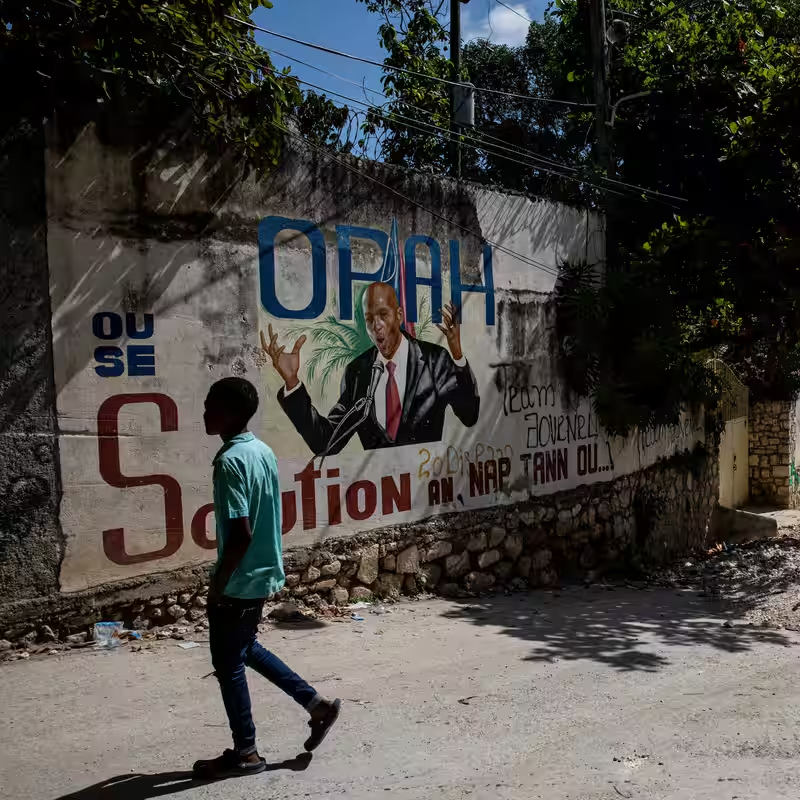Table of Contents
- The Night Jovenel Moïse Was Killed
- Who’s Been Charged in the Assassination?
- Haiti’s Trial Collapses Amid Chaos
- Miami Trial Stalls Over Evidence and Access
- Why This Case Matters for Haiti’s Future
- Sources
The Night Jovenel Moïse Was Killed
On July 7, 2021, Haiti’s democratically elected president, Jovenel Moïse, was gunned down in his bedroom in a brazen attack that shocked the world. His wife, Martine Moïse, was wounded but survived. According to her account, Spanish-speaking men stormed their home outside Port-au-Prince, shouting phrases like “Eso no es” (“That’s not it”) as they ransacked rooms—suggesting they were searching for something specific.
Moïse’s body, bearing 12 bullet wounds and severe trauma, was found near a copy of the Haitian Constitution—a grim symbol of a nation in crisis. Four years later, the mastermind remains unidentified, and justice continues to stall.
Who’s Been Charged in the Assassination?
Dozens have been implicated across two parallel legal proceedings—one in Haiti, the other in Miami. Among those accused:
- Martine Moïse – Charged in Haiti with conspiracy (though a witness, not a defendant, in the U.S.)
- Joseph Badio – Former Justice Ministry official, alleged plot orchestrator
- Claude Joseph – Former prime minister at the time of the killing
- Leon Charles – Ex-police chief
- Christian Sanon – Florida-based pastor who allegedly believed he’d become president afterward
- Arcangel Pretel Ortiz – Former FBI informant accused of planning the operation
- 18 former Colombian soldiers – Hired via a Florida security firm; two extradited to the U.S.
Haiti’s Trial Collapses Amid Chaos
In a stunning reversal, Haiti’s appeals court recently dismissed the entire domestic case against 51 defendants—including Martine Moïse—citing a “shoddily pursued” investigation. Judges ruled that key witnesses were never interviewed and evidence was mishandled.
Despite the dismissal, most suspects remain jailed without trial. Defense attorneys argue this amounts to “illegal detention,” with clients suffering prolonged imprisonment based on a flawed probe. “Now, due to this poor investigation, the illegal detention continues,” said Marc Antoine Maisonneuve, representing the Colombian defendants.
Miami Trial Stalls Over Evidence and Access
The U.S. federal case in Miami faces its own hurdles. Defense lawyers demand access to five Colombian commandos imprisoned in Haiti—but U.S. prosecutors say gang violence and diplomatic barriers make interviews impossible.
According to State Department affidavits, U.S. officials can’t even visit the Haitian prison—once a children’s rehabilitation center—without armored convoys and police escorts. Meanwhile, much of the physical evidence originates from Haiti, where chain-of-custody standards fall short of U.S. legal requirements.
Some evidence remains classified for “national security” reasons, further complicating fair trial guarantees. Defense motions to dismiss argue the U.S. government is shifting blame onto Haiti’s dysfunctional institutions.
Why This Case Matters for Haiti’s Future
The unresolved assassination isn’t just a legal failure—it’s a threat to Haiti’s very democracy. With no elections held since Moïse’s death, the country teeters on the edge of perpetual instability.
Historians draw parallels to 1806, when Haiti’s founding leader Jean-Jacques Dessalines was assassinated and his killers never brought to justice—a void that triggered civil war. Today, Haitians fear history is repeating itself: elites manipulating power, impunity reigning, and ordinary citizens losing faith in the rule of law.
As one expert put it: “Haiti desperately needs a symbolic moment of justice to end a long history of impunity.” Without it, the cycle of violence and political chaos may never end.




